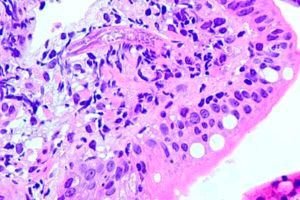
All iLive content is medically reviewed or fact checked to ensure as much factual accuracy as possible.
We have strict sourcing guidelines and only link to reputable media sites, academic research institutions and, whenever possible, medically peer reviewed studies. Note that the numbers in parentheses ([1], [2], etc.) are clickable links to these studies.
If you feel that any of our content is inaccurate, out-of-date, or otherwise questionable, please select it and press Ctrl + Enter.
The human body produces antibiotics
Last reviewed: 02.07.2025

A team of American specialists has found antibiotics in the human body, and quite powerful ones at that. During the research, an analysis of the human intestinal microflora, as well as bacteria that live on the skin, was conducted. As a result, scientists were able to identify antibiotics that were named humicin A and B. According to scientists, they do not work as regular antibacterial drugs, but as "boosters", i.e. they increase the effect of drugs.
The research was conducted at Rockefeller University by a team of scientists led by Sean Brady. The experts managed to find a way to produce antibiotics faster and cheaper. As is known, the scientific community is currently actively solving the problem of antibacterial resistance, bacteria have developed the ability to quickly develop resistance to antibiotics and scientists have to constantly develop new types of drugs, otherwise, humanity will remain unprotected from bacteria and the level of medicine will return to a couple of centuries ago, when even a sore throat can end in death. It is worth noting that the constant search for new antibiotics is quite expensive, since a decent amount is spent on research (from 800 million to 1 billion dollars), and after a while you have to start all over again, since bacteria have learned to quickly develop resistance.
Antibiotics found in the human body are active against "superbugs" and Sean Brady and his colleagues have developed a method that makes the process of producing new antibiotics faster and cheaper. Scientists have created a unique method of virtual gene analysis that helps identify microbes in DNA that promote the growth of molecules that destroy pathogens in the body.
According to scientists, humicins A and B have demonstrated high efficiency in the fight against bacteria that have developed resistance to modern antibiotics.
The specialists conducted experiments on rodents and found that a group of mice that received antibiotics with humicin A and B survived after being administered a lethal dose of staphylococcus. In total, the scientists used 2 groups of mice, one of which was administered modern antibacterial drugs. The studies showed that dozens of genes are responsible for the synthesis of substances vital to the cell, and Brady's team plans to begin searching for similar molecules in the DNA of other bacteria and develop new effective antibiotics.
The human body is unique and holds many more secrets. In addition to antibiotics, our body is capable of producing painkillers that are an order of magnitude better than morphine in their effect. In France, a team of specialists found a special substance in human saliva, which, as experiments have shown, has a painkilling effect 6 times stronger than morphine. The new substance was named opiophrine and scientists have already tested it on rodents. Rats were injected with chemicals that caused them severe pain, the introduction of opiophrine completely relieved the animals of painful sensations, in another group of rats, which were injected with morphine, 6 doses of a drug similar in action were required for the pain to completely disappear.
While scientists still do not know the exact mechanism of action of the new substance, studies have shown that it is capable of slowing down the breakdown of molecules responsible for the nervous system's response to pain. According to French specialists, effective painkillers can be developed based on opiofrin.
